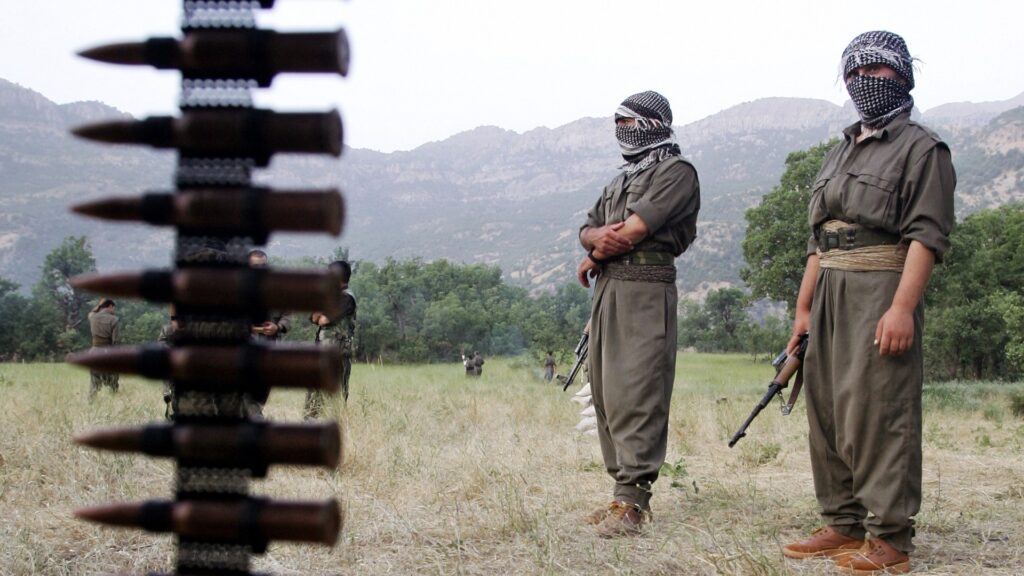When Israel and Iran struck each other last year in a series of escalatory steps involving air attacks and cruise missiles, every country in the region raised its alarm levels.
Ankara encouraged calm for both countries, despite its severe criticism of Israel’s war on Gaza, which it describes as a full-blown genocide.
However, the escalation seemingly pushed Ankara to address its decades-long problem with the Kurdistan Workers’ Party (PKK), which had waged a 40-year war against the Turkish state in Syria, Iraq and Turkey in the name of greater rights for the Kurds.
For Turkish officials, the PKK, a left-wing armed group with sufficient regional knowledge to make strategic overtures to state actors such as Russia and the US, could be a potential pawn for Iran and Israel.
After months-long negotiations with Ankara, the PKK on Monday announced that it is disbanding and ending the armed struggle.
New MEE newsletter: Jerusalem Dispatch
Sign up to get the latest insights and analysis on
Israel-Palestine, alongside Turkey Unpacked and other MEE newsletters
The decision, if successfully implemented in a convincing and verified manner, would usher in a new era within Turkish society, as it would finally establish social peace.
Also, it would be a regional victory for Ankara.
“I think the disarmament of the PKK is a major strategic win for Turkey, with big implications for both Syria and Iraq,” Andreas Krieg, a senior lecturer at the School of Security Studies at King’s College London, told Middle East Eye.
“It also shifts the regional balance in Turkey’s favour – especially in relation to Iran and Israel.”
Iran losing a potential partner
The PKK’s relationship with Iran has been complicated.
Through its Iranian arm, the Kurdistan Free Life Party (PJAK), the group also waged war against Tehran for decades but declared an indefinite ceasefire in 2011. However, this did not stop the Iranian government from trying to spoil a peace process in 2013 between Turkey and the PKK.
Turkey has often accused Iran of turning a blind eye to PKK manoeuvres near the border. For instance, Turkish Defence Minister Yasar Guler said last year that it was puzzling to observe Iranian military inaction in instances where the Turkish government had informed Tehran of the PKK’s whereabouts.
‘With Assad gone and Hezbollah weakened, the PKK’s disarmament removes another potential Iranian proxy from the board’
– Andreas Krieg, analyst
Meanwhile in Iraq, where Turkish troops have been deployed to battle the PKK, Turkey would be rid of a huge financial and security commitment that has cost billions of dollars over decades.
Some PKK elements, such as the Sinjar Resistance Units (YBS), have been indirectly supported by Iran, with their salaries paid by Iraqi paramilitaries close to Tehran.
A Rudaw report on Monday said that the YBS does not expect a quick evacuation of PKK fighters from its bases in Sinjar, where the Turkish military, Iraqi army and Kurdistan Regional Government forces have been in a standoff for years, indicating further challenges.
But with Bashar al-Assad’s government in Syria gone and Hezbollah on the back foot due to Israeli attacks, Iran is facing a new chapter in the region.
“This is a clear win for Turkey against Iran. With Assad gone and Hezbollah weakened, the PKK’s disarmament removes another potential Iranian proxy from the board,” Krieg says.
“With all of those fronts collapsing, Iran loses the ability to project power westward, effectively ending its long-held ‘land corridor’ to the Mediterranean.”
Israeli overtures
With Israel, the situation is even more complicated. A series of Israeli governments lent political and military support to Turkey in the 1990s against the PKK, establishing a close alliance with secularist generals at the time.
But under Turkish President Recep Tayyip Erdogan’s rule, the relationship deteriorated, and Ankara from time to time has accused Israel of indirectly supporting the PKK.
The relationship has reached a low point following the Gaza war, and Israeli official statements regarding “the Kurds,” particularly concerning PKK-linked groups in Syria, subsequently shifted.
Israeli Foreign Minister Gideon Saar in November openly called for closer relations between Israel and Kurdish communities. He said his country should reach out to Kurds and other regional minorities that are “natural” allies.
Saar said Kurds are “a victim of oppression and aggression from Iran and Turkey” and that Israel needed to strengthen ties to them. “This has both political and security aspects,” he added.

Turkey and the PKK: Who is Abdullah Ocalan?
Read More »
After Assad’s fall in December, Israeli public news outlet Kann reported several engagements between Israel and the Syrian Democratic Forces (SDF), a US-backed armed group spearheaded by PKK offshoots.
MEE reported in December that Israel has been planning to divide Syria into four regions, including ones for the Druze and the Kurds, to keep its neighbour weak and fractured. The plan has infuriated Turkey.
However, Turkey’s engagements with the US pushed the SDF to sign a deal with Syrian President Ahmed al-Sharaa, effectively abandoning plans for an independent or autonomous Kurdish region in the country.
The deal, which is yet to be smoothed out due to internal challenges, was also a demand by PKK leader Abdullah Ocalan, who called on his followers to abandon demands for any form of autonomy and urged them to participate in democratic societies and politics within nation states.
Importantly, the PKK’s disarmament will potentially stabilise Syria, as Sharaa’s central government will be more emboldened.
“Israel benefits from Iran’s retreat, but Turkey’s rising power challenges Israeli influence in the Levant,” Krieg says.
“The PKK and other Kurdish groups have been important proxies for Israeli strategic depth in the Levant.”

